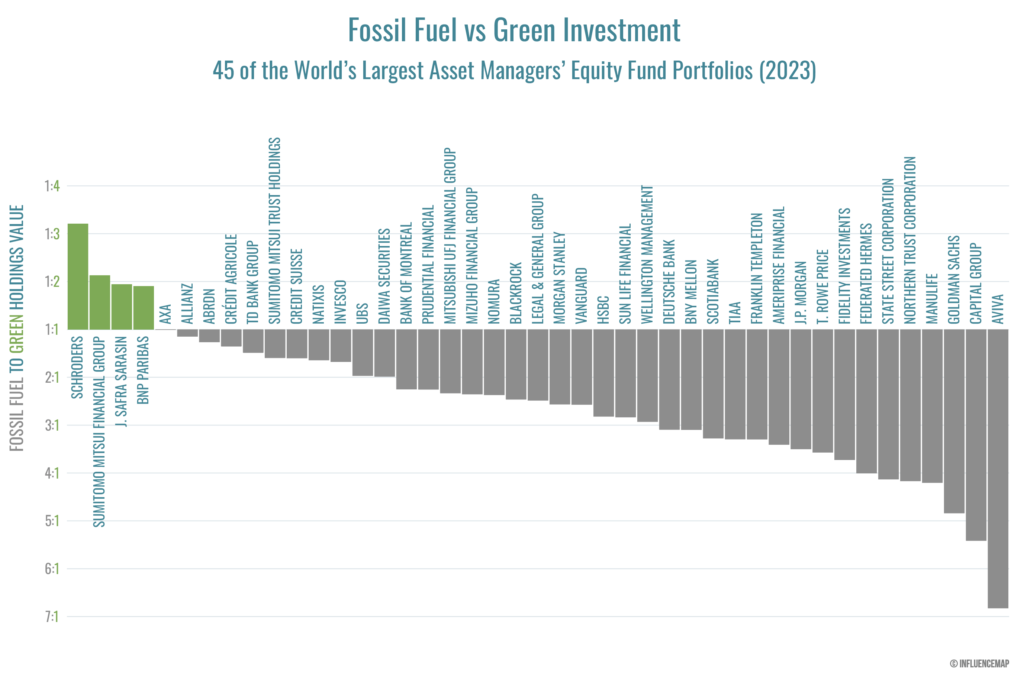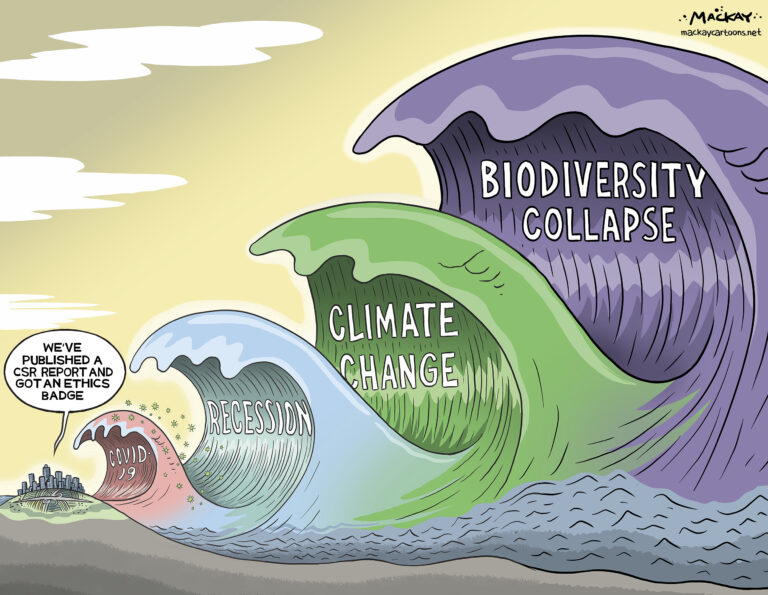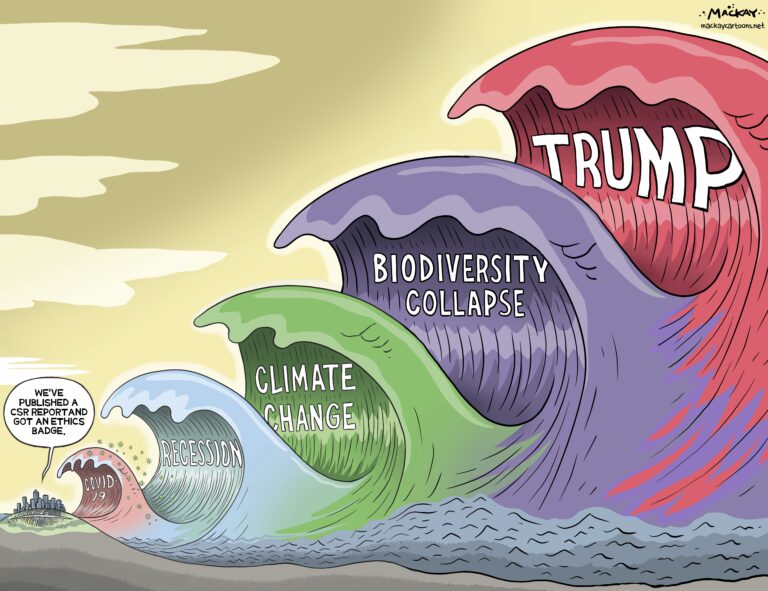Impact events promise the world. What if their sponsors are helping to destroy it?
Concerns about talking shops, virtue-signalling and purpose-washing are widespread – and sometimes justified – in the conference circuit. Event sponsors can no longer rely on big claims or good intentions: they must take every opportunity to prove they’re not making today’s problems worse.
This article was originally written for Pioneers Post and appears here.
I have nothing but respect and admiration for Greta Thunberg. Nonetheless, I do wish she had played her hand differently in regards to the Edinburgh International Book Festival this summer. She made the headlines for changing her mind about appearing there on the basis that one of its sponsors, Baillie Gifford, invests in fossil fuels.
I contend Baillie Gifford – which is more interested in investing in green assets than most of its competitors – was a misplaced target and that Greta has failed to deploy one of the most powerful tools any of us have for being on the right side of the polycrisis. That is to identify and reward those businesses that are actively seeking to be part of the solution, at the expense of those that are not. As consumers, employees and investors, we can, and I would argue we must, help create and be part of this race to the top.
We won’t escape our dependency on oil by tomorrow. We’re not going to end and replace capitalism any time soon. I for one find it easier to imagine that the world will end first. But we can set better incentives for better outcomes. For example, we can identify and reward all those businesses seeking to be part of the transformation to a low carbon future, as fully, speedily and completely as possible, at the expense of the laggards and climate change deniers.To which end, Influence Map conducts climate analysis of the world’s largest asset managers and of their portfolios, stewardship and policy influence. And guess what, Baillie Gifford appears to outperform almost all its peers on a key metric, its ratio of fossil fuel to green investment assets. In this chart (the full report can be downloaded here), they would appear to the left of Schroders if included.

The question of appropriate sponsorship is relevant to many events, including one that I have been involved in since 2021, Anthropy. I’m not entirely comfortable with every aspect of this year’s three-day event. It would be illogical to expect I should be. But I see further extraordinary potential in this event and growing movement, and – rather than turning my back on it – choose to try to help realise that from the inside.
What Is Anthropy
Styled as ‘a launchpad for change’, Anthropy took root in early 2021 as a result of concerns for the economic and social impacts of Covid-19, the negative public discourse arising from Brexit and other challenging national issues. Its formidable founder, John O’Brien, challenged himself and his network to put aside divisions, silos and egos, and focus on creating a new, longer term, positive vision of Britain and its place in the world.
Would the inaugural event which ran 2-4 November 2022, turn out to be a ‘Glastonbury of Good’? Were parallels to the World Economic Forum at Davos useful or appropriate? Well, it was certainly at an inspiring yet hard-to-get-to location. There was no skiing, but we did have these extraordinary biomes and spaces. The Eden Project, where it took place, is one of the UK’s most visited tourist attractions and rightly so. It is a special, wonderful place. We were surrounded by nature, in a place that so uniquely presents and worships it, imploring the millions who visit each year to do likewise. But this was a special place and a special moment. More than 1,000 senior leaders and social impact influencers were inspired to attend. There were 450 speakers, across 184 separate sessions, on 14 different stages, over three wonderful days.
John persuaded 34 sponsors to foot the lion’s share of the costs, which easily ran into seven figures. On day 2, Sir Tim Smit, The Eden Project’s co-founder, had seen enough to offer his extraordinary venue again for five more years of Anthropy conferences. “Eden was built for this,” he declared.
One of Anthropy’s great features is that it is an enormous collaboration. I decided to take a punt on it back in May 2021. I was happy to volunteer as and where needed and, in time, was counted as one of 200 ‘agenda setters’. I worked closely with my now dear friend Mark Goyder, founder of Tomorrow’s Company, and Adnams’ CEO Andy Wood within the ‘Prosperity Pillar’ whereby we conceived and developed three panels.
In Eden’s incredible rainforest biome, Mark chaired the discussion on ‘A 21st Century Vision Of The Economy’ with panellists Andy Haldane, Jane Craig and Eoin Murray. I chaired the ‘21st Century Vision Of The Economy: A Focus On Food’ discussion with speakers William Kendall and Kresse Wesling, both regenerative agriculture experts and world class entrepreneurs. ‘The Enabling Conditions for a 21st Century Economy’, again chaired by Mark, boasted further rockstar panellists: Margaret Heffernan and Ketan Patel.
This year the themes cover everything from digital technology to future generations to water and air, and much more. Mark and I are collaborating again this year. We’re also working with Jane Shaw and between us will deliver the sessions Selling Degrowth with Erinch Sahan, Hans Stegeman, and How Climate Politics Obstruct Climate Action And What To Do About It with Simon Glynn, Rupert Read and Jo Swinson. Do get in touch if you’d like to contribute thoughts or insights on either of these.
How Does This Fit With the No More Business As Usual Story
The inaugural Anthropy last November was an incredible experience. I expect the same to be true of this year’s event. But Anthropy is one of an increasing number of impact summits and conferences globally, every one of which promises to be special and different. And while it is nice to get out, to meet new people, to make new connections, to hopefully hear from an inspiring speaker or two, a key test of the worth of a conference or event must be: what changes as a result?
Responsible 100, the initiative I run, has a particular take on how the world, er, works. In summary, we view Business As Usual (or ‘BAU’) as The Problem. It is the normalisation of our dominant global economic and political systems which continue to combine to destroy nature and harm society, while concentrating wealth and power in the hands of the miniscule number of people who benefit, and who thus think BAU works just fine.
It is the inevitable result of rewarding and incentivising private profit maximisation over everything else. Further, BAU puts companies which attempt to reduce their offloading, their externalising and their exploiting at a very significant cost disadvantage to all less scrupulous competitors who couldn’t give a fig.
The Race To The Top (or the ‘RTTT’) is The Solution we propose. We want to catalyse the Race To The Top and thus enable all businesses to compete on price and quality, as they do now, but also in respect of how much more net positively they can impact people and the planet. Taking part in the RTTT means operating your business such that you are minimising negative impacts, and maximising positive impacts, as fast, far and wide as you possibly can. Responsible 100 is designed to support businesses in doing this work.
Businesses competing in the RTTT are those firms internalising costs that others externalise. They can afford to do this because they can enjoy a wide variety of benefits, such as reputational gains, the attraction and retention of the best talent, the propulsion of innovation, the creation of exceptional cultures, the reduction of risks, the opening up of new worlds of opportunity, and the multitude of ways in which leadership can thus be redefined. Such benefits may be reaped when consumers, employees and investors are empowered to identify and support the businesses with the highest (and/or the most rapidly increasing) RTTT: BAU ratios. One might imagine a league table or chart not unlike that from Influence Map above.
However, we’ll only possess our critical, powerful influence once we’re able to cut through the greenwash and the make-believe. Once this is achieved, once we have agency, then more and more businesses will stagnate and fail in BAU, and more and more will thrive in the RTTT. Norms and expectations on all businesses will continue to shift. When real responsibility drives exceptional innovation, success and profits, we’ll raise the floor in terms of minimum acceptable standards, and we’ll raise the bar in terms of what is imaginable and achievable.
The Challenge to the Sponsors
Organisations that communicate their ethical credentials are often met with scepticism or at least questions. Especially larger business organisations. Given most people’s experiences of the world and of large businesses, this is entirely reasonable. The challenge to the sponsors of Anthropy, and of every event like it, is to ensure they are believed when making claims about their motives for sponsoring, and about their values, ethics, purpose and sustainability credentials generally. And to understand the implications of not being believed.
In the impact space, concerns about talking shops, virtue-signalling, corporate jollies and purpose-washing are widespread. They stem from years of disappointment and thousands of events where such behaviours were evident and where no worthwhile change was achieved. Or worse, business as usual was further advanced and engrained. If we cannot remedy this, our fate seems sealed. Each week brings footage of more deadly havoc wrought by a changed and furious climate, and accompanying data and graphs. We are now deep into uncharted territory.
For me, the most compelling thing about Anthropy is that its raison d’etre is to ‘go there’ and grasp these nettles. Its aim is to create the change the world needs, and to explore unlikely collaborations and avenues through which this might be achieved, with full cognizance as to the perniciousness of our apparently inescapable BAU.
In May this year, John O’Brien gave an interview to Volans to explain his vision and motivations for pursuing such an ambitious and important project and some of his developing thinking. He shared his belief that, as a nation, we have got ourselves into a situation where we are continuing to invest in systems that don’t work. He said that, fundamentally, our systems are getting in the way of innovative thinking, and that powerful vested interests seek to maintain the status quo. John urged us to explore avenues outside the system, reject box-ticking and business as usual processes, and find different ways to create real change. He urged us all to find the courage to cross the room, to approach people we may not normally agree with, because then, with the best intentions and with open minds, respectful and productive discussions can be entered into and real change can result.
In that spirit, I suggest the real challenge to those present at Anthropy23, and in particular to the larger sponsors of the event, is to leave no room for doubt as to which side of the problems and the potential solutions they stand on.
This year’s sponsors include some businesses that have not lived up to the standards (on climate action and other areas) that many of us expect. To them, and to all future sponsors of all future impact events, I suggest that the time has passed to claim that your business wants to help create a better Britain or a better world without taking every opportunity to prove it. If you really mean it, if it is really true, then wouldn’t you surely want to prove it?
As a committed Anthropist, I’ll be crossing rooms, shaking hands and asking as many of the larger sponsors as possible whether they acknowledge and accept my descriptions of business as usual and of the race to the top. I’ll invite them to explore the extent to which they participate in both – we all do to some extent. Where I see huge opportunity is in measuring or at least approximating our BAU:RTTT ratios so that we may commit to continually improving them, and so that we can call in all those stakeholders who will support us and back us in this critical effort. To be clear: I’ll support any business that is committed to competing in a race to the top, to benefit itself and wider society. With this, with genuine openness and honesty, and with the acknowledgement that proof is needed and will be provided, they also provide us with the hope and belief we all need that real transformation is achievable.
I’ll report back on how I get on.




